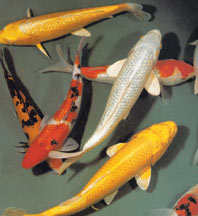
Japanese Koi are bred from the finest bloodlines of show champions. The High-Quality rating is the result of breeders evaluating physical size, physical characteristics, patterns, colors, and overall behavior/presence. Common strains include:
Asagi, Ginmatsuba,
Kohaku, Kujyaku,
Taisho Sanke,
Platinum Ogon,
Yamabuki Ogon,
Showa, Doistu, and Kawarimono.
The ideal set-up for the Japanese Koi is a pond of at least 1,000 gallons with a gravel substrate, rocks, and hearty plants. Koi like to eat the roots of plants and will dig to get to them, so provide large rocks around the base of the plants to protect them. Adequate
filtration should be provided in order to maintain proper water conditions. Japanese Koi can live over 200 years, but the typical life span is 25 to 35 years.
The male can be differentiated from the female by the concave anal section and sometimes breeding spots on the head. Spawning may result in as many as 1,000 eggs and the fry emerge in 4-7 days, depending on water temperature. Feed the fry small live foods, and/or frozen daphnia for the first 3-4 weeks, then gradually switch their diet to crushed
pellets or
flake food. Their colors will emerge in about 3-12 weeks.
| Interesting Facts: |
| The Japanese Koi requires a quality pellet or flake food that does not exceed 30% protein. Ideal pond mates include: other
Koi,
Comets, and
Shubunkins of similar size. |
| Species: |
Cyprinus carpio |
| Origin: |
Japan |
| Size: |
Up to 36 inches |
| Diet: |
Omnivore |
| Pond Setup: |
Freshwater; hearty plants, rocks, gravel substrate |
| Pond Conditions: |
36-90°F; pH 6.8-7.2; dH 2-12 |
| Min. Pond Capacity: |
1,000 gallons |
| Light: |
Natural |
| Temperament: |
Peaceful |
| Swimming Level: |
No specific level |
| Care Level: |
Easy |
| Reproduction: |
Egg Layer |
|
|